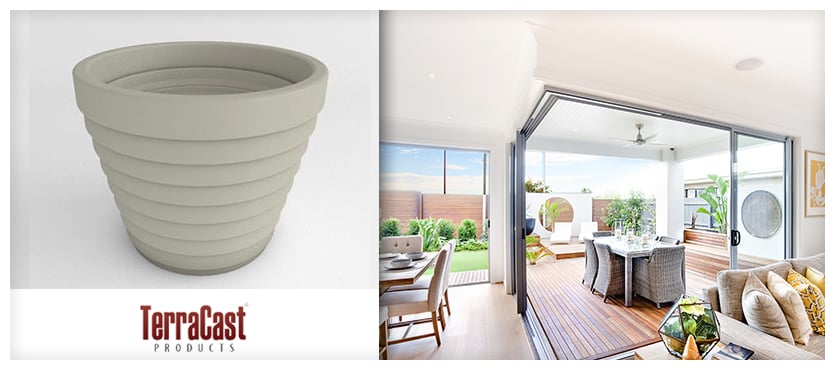If you are in the market for oversized indoor or outdoor planters for your landscaping project, you may wonder what material would work best for your application. With various materials available in the planter market, it is essential to understand the difference in each material and its benefits.
When selecting an extra-large outdoor planter, consider the material’s durability, weight, and maintenance requirements, as well as its design and compatibility with your overall landscape design. By selecting the right material, you can ensure that your extra-large planters will provide long-lasting beauty and functionality to your outdoor space.
Which Planter Material is Right For You?
Resin Planters
Resin is a durable and lightweight material that is often used in various applications, including planters and garden pots. Resin is weather-resistant, so the planters can withstand exposure to sunlight, rain, and other outdoor elements without fading or deteriorating, making them suitable for both indoor and outdoor gardening.
Pros
- Lightweight
- Durable
- UV Resistance
- Weather-Resistance
- Impact-Resistance
- Maintenance-Free
- 10-Year Warranty
- Recyclability
Cons
- Not High-Gloss Finish
- Limitations on Intricate Designs
Fiberglass Planters
Fiberglass planters are containers made from fiberglass, a reinforced plastic material that consists of fine glass fibers embedded in a resin matrix. Fiberglass planters come in a wide range of designs, shapes, and sizes.
The material is versatile and can be molded into various styles, including traditional, modern, and contemporary. Fiberglass has excellent insulation properties, which can benefit plant roots. It provides a stable environment for plants, protecting them from extreme temperatures.
Pros
- Aesthetic
- Weather-Resistance
- Size and Color Options
- Lightweight
- Low-Maintenance
Cons
- Cost
- Fragility
- Recyclability
- Sustainability
Clay Planters
Clay planters, also known as terracotta planters, are containers made from clay or earthenware. Clay planters are porous, meaning they allow for the exchange of air and moisture between the soil and the surrounding environment. This porosity helps regulate moisture levels in the soil, allowing for better aeration and drainage.
Pros
- Aesthetic
- Size Options
- Air Permeability
Cons
- Weight
- Cost
- Fragility
- Not Weather Resistant
- Porous – Need More Water
Concrete Planters
Concrete planters are containers made from a mixture of cement, sand, gravel, and water. They offer a sturdy and durable option for displaying plants, both indoors and outdoors. However, they can be challenging to move or rearrange once in place due to their weight. While concrete planters are susceptible to wear and tear, they offer a study solution for outdoor gardening.
Pros
- Aesthetic
- Custom Capability
- Durability
- Security
Cons
- Weight
- Cost
- Prone to Cracking
- Environmental Impact
Wood Planters
Wood planters are crafted from various types of wood, including cedar, redwood, pine, oak, or teak. They have a warm and organic aesthetic that can complement a variety of garden styles. The durability of wood planters depends on the type of wood used and they require regular maintenance to preserve their appearance and durability.
Pros
- Aesthetic
- Custom Capability
- Lower Cost
Cons
- Susceptible to Rot and Insect Damage
- Weight
- High Maintenance
- Environmental Impact
Metal Planters
Metal planters can be made from different types of metals, each offering its own characteristics. Steel and aluminum are lightweight and resistant to rust, making them suitable for both indoor and outdoor use. Iron planters are sturdy and durable but may require additional rust-resistant coatings or maintenance.
Pros
- Aesthetic
- Custom Capability
Cons
- Corrosion
- Rust
- Weight
- Heat Retention
- Environmental Impact
Conclusion
Generally, resin products have exceptional performance in the most challenging environment. If you are looking for environmental-friendly products for your garden that are durable, weather-resistant, and can gel with any aesthetic, TerraCast® products are the ultimate solution.
LLDPE resin is more lightweight and flexible than other materials, making it the most versatile option. In addition, the resin material is color-through, which means any scratches or gouges are inconspicuous compared to containers with a painted finish. If you are curious about our products and services, call us today!

